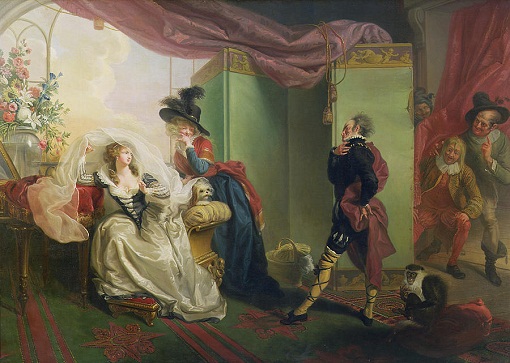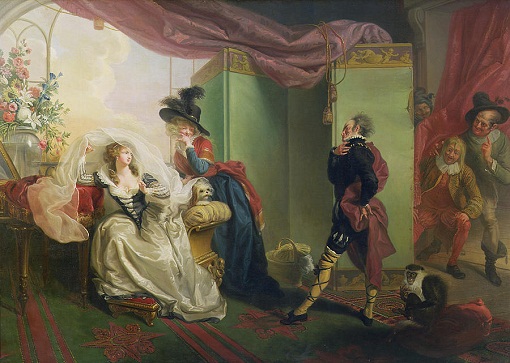 \
\
This week Jonathon proudly presents CARRY ON BARDING, or, Much Ado About Pistol’s Cock, as he looks at Shakespeare and slang; and how the Carry On films might owe more to the Bard than you’d expect…
Hamlet: Lady, shall I lie in your lap?
Ophelia: No, my lord.
Hamlet: I mean, my head upon your lap?
Ophelia : Ay, my lord.
Hamlet: Do you think I meant country matters?
Ophelia: I think nothing, my lord.
Hamlet: That’s a fair thought to lie between maids’ legs.
Ophelia: What is, my lord?
Hamlet: Nothing.W. Shakespeare The Tragedy of Hamlet, Prince of Denmark c. 1600
Dr. Kenneth Soaper (Kenneth Williams): It has been my experience that once young people sample the delights of country life and the wonders of nature they just can’t get enough of it.
Miss Haggerd (Hattie Jacques): Exactly.
Dr. Kenneth Soaper: Well I was thinking of the girls…
Miss Haggerd: So was I.
Dr. Kenneth Soaper: Exactly.T. Rothwell Carry on Camping or Let Sleeping Bags Lie 1972
It is tempting to ascribe the latter scene to the former, what the lit. crit. world calls intertextuality and what the less guarded among us might see as plagiarism. Not so, and it would be to traduce the ex-pilot Talbot Rothwell who surely picked up his doubles entendres in the wartime RAF messes of which he was doubtless an adornment, rather than from scanning the Bard. And in any case, the point is the reverse. Not that Carry On films jam an elbow into your ribs, removing it only to jab it back even harder, but that Shakespeare, that epitome of ‘literature’ was already there so long before.
Nudge-nudgery has always lain at the heart of British humour, and of the various deformations and explorations of linguistic possibility that make up slang, playing with double meanings, usually if not invariably smutty, are to be found in abundance. The jolly rustics spouting low humour have a time-honoured place in theatre (indeed the first ever recordings of slang in French are in 13th century passion plays, in which the rib-ticklers are delivered in the very shadow of the cross) and Chaucer, for instance, gives us plenty of bawdy. But Hamlet is hardly a laff riot, and Hamlet’s double entendres – lap: vagina, c(o)untry matters, and nothing, again the vagina, which Francis Grose in his 1785 slang dictionary defines thus ‘( )’, i.e. ‘nothing’ – are delivered reflectively, and shortly after he briefs the Players on the delivery of their play within a play. It is one of Shakespeare’s many great speeches, and there are no rustics here, no nudges either.
The doubles entendres, however, are inescapable and Shakespeare, for all his elevation to literature’s Parnassus, has no desire to run away. Take Romeo and Juliet, another that gets listed among the tragedies. ‘O, that she were / An open et-caetera, thou a poperin pear!’ Nothing, one can be assured, to do with fruit, though it does suggest what elsewhere he describes as plucking. Any more than is his use of fig. Nor is an aunt a relation, a nunnery remotely religious (even if it is populated by nuns, not to mention an abbess), nor the low countries (or indeed the netherlands) even vaguely Dutch. And as for that bizarre image of copulation: groping for trout in a peculiar river… The play also offers bauble for penis, bird’s-nest for pubic hair and salt-fish for vagina, as well as the once widely used sir-reverence for excrement, which led to Grose’s 1796 definition of reverence: ‘an ancient custom which obliges any person easing himself near the highway or foot-path, on the word reverence being given to him by a passenger, to take off his hat with his teeth, and without moving from his station to throw it over his head, by which it frequently falls into the excrement …’
Shakespeare uses, at my count, just under 500 ‘slang’ terms: 49 of them represent the penis, 56 the vagina, 55 the world of prostitution, 30 the anus or buttocks and 80 sexual intercourse. That’s around half his slang lexis and all of them draw on slang’s primary stock in trade: sex. There are very few of what modernity categorises as ‘obscenities’; a list – by necessity short – would include foutra (i.e. fuck) in ‘a foutra for’, cock for penis, but only as a double entendre, come, to achieve orgasm, hole for vagina, and piss as both noun and verb – and piss, in 1600, was hardly slang. The double entendre, surrounded by pretty penetrable context, is far more likely: juggle or occupy for intercourse, plum-tree or medlar for vagina, sword and weapon for penis.
All these and much else that in my book qualifies as slang too. But there’s the rub.
Slang is a bugger before the 18th century. The first dictionary that might be seen as including ‘civilian’ alongside criminal slang, appeared only in 1698. The word itself doesn’t come on stream in the context of language till 1756 (with a few adjectival references that equate slang with ‘corrupt’ twenty years before that) so what do we do with all those terms that I have plucked from the Bard and which have long since settled into to the slang dictionaries. Can we define a lexis as slang in a world where slang does not yet exist? Is it just groundling talk? The street’s unfettered alternative to what by 1600 was established the early modern version of Standard English and as such toff-speak.
We do not know, in any case, to what extent these ludic winks and nudges had the gallery roaring. The groundlings may have heard nothing much beyond their own conversation thrown back to them. The sexual references, so alarmingly gross in the ‘free and easies’ of the 1830s, may have passed without comment. The parallel with Carry On movies may be semantic rather than social.
It is a truism that low comedians yearn to play the tragic greats. Sid James, of course, did play Marc Antony, albeit in Carry On Cleo (Kenneth Williams was Julius Caesar.) It may be, however, that we have it arse-about face. Hamlet, had he but known, might have shone as Sir Sidney Ruff-Diamond or the Rumpo Kid.
Malvolio: By my life, this is my lady’s hand: these be her very C’s, her U’s, and her T’s; and thus makes she her great P’s.
Shakespeare Twelfth Night 1600
Stuart Farquhar: Please, Miss Plunkett, you’re squashing my itinerary.
Moira Plunkett: Oh, I’m terribly sorry. I keep on forgetting what a big girl I am now.
Stuart Farquhar: Quite, shall we get them out now?
Moira Plunkett: Why, Mr Farquhar!
Stuart Farquhar: The people for the coach, I mean.
Moira Plunkett: Oh, those. Yes, of course.Rothwell Carry On Abroad 1972
Plus ça bleedin’ change, eh.













There can have been no greater outpouring of the dark art of nudge-nudge, wink-winkery than the Taylor-Burton Taming of the Shrew, not since the mistresses Boleyn plied their wares and doffed their clouts for old Henry have such doings graced the public arena. Shakespeare was Goethe’s hero, goodness knows what the strait-laced old kraut thought of the bawdiness, young Werther by comparison was a paragon of virtue, possibly the cause of his leiden. We won’t even mention Purcell’s Oberon ‘n Titania show, credits to the bard, and the woodland glade naked frolics, kind of a seventeenth century Confessions of a Fairy show, minus Cherie Blair’s dad. Britten’s version wouldn’t even get past the censor.
One turf shall serve as a pillow for us both.
One heart, one bed, two bosoms and one troth.
Troth, yeah, right, know what I mean squire, know what I mean.
“Nudge-nudgery has always lain at the heart of British humour”… Well, and plenty other as well, surely: Rabelais for example, or Aristophanes. I suspect, based on the latter, that the groundlings understood and enjoyed it all.
Have you read Blogmanship, George? Right up your street, I think.
“(and conversely, if you are American – annoy Britons)”. It appears that I have this converse down pat; is the rest really worth the price?
Yes.
I have heard discussion of Shakespeare’s use of the word ‘Medlar’ in Hamlet before, I think it may have been on the One Show, or perhaps CountryFile, any way they were looking at a medlar fruit and saying that it was used as a euphemism for the back entrance, rather than the front?
A fascinating post as always.
Foutra’s cognate ‘foutre’ is still widely used here in France, often as argot for ‘faire/to do’, though ‘baiser’ has taken over its ‘to fuck’ usage leaving ’embrasser’ to take care of the kissing. ‘Foutre’ has come (oh dear) to be a slang term for ‘sperm’.
I’ll stop now, I don’t think Mr Slang needs any more coal delivered to his Newcastle address.
The natural response of students when encountering filth in antique texts is disbelief that people knew about such things in the olden days. Do you suppose that every generation thinks it invented sex?
A question for you Mr Slang: did the word ‘blow’ have the same sexual meaning for the Elizabethans as it does for us? I remember being brought up short by the apparent filthiness of this piece of banter in All’s Well That Ends Well — and then wondering to what extent the filth was in my own mind. The virginal Helena asks the soldier Parolles what defence a virtuous maid may have against the assaults of men:
PAROLLES: There is none: man, sitting down before you, will
undermine you and blow you up.
HELENA: Bless our poor virginity from underminers and
blowers up! Is there no military policy, how
virgins might blow up men?
PAROLLES: Virginity being blown down, man will quicklier be
blown up: marry, in blowing him down again, with
the breach yourselves made, you lose your city …
Just wondering (it’s not the sort of thing your average scholarly notes cover).
These are the recorded first uses of blow in a sexual sense:
(a) to bring to orgasm:
1650 ‘As I Travers’d To & Fro’ in Farmer Merry Songs and Ballads (1897) V 19: Limping Vulcan he came […] Venus follow’d after him, / And swore she’d blow the bellows.
(b) to reach orgasm; thus blowing n.:
1700 ‘Song’ in Playford Pills to Purge Melancholy II 199: They stripp’d to go to’t, ’twas hot Work, and hot Weather; / She kindl’d a Fire, and soon made him blow.
(c) (also blow off) to fellate; occas. to perform cunnilingus; thus blown adj.:
c.1930 (ref. to late 19C) N. Kimball American Madam (1981) 204: The Greek contractor wanted me to blow him in the bundle room.
(d) (US) to have sexual intercourse:
1970 in E. Cray Erotic Muse (1992) 58: My old man’s a trumpeter, / A very fine trumpeter is he. / All day he blows trumpets. / At night he comes home and blows me.
None, as you can see, are old enough. That said, ‘first use’ is mutable.
However I would suggest that while the use of blow in AWTEW is undoubtedly sexual, the sense, as regards virginity, is that of standard English blow up (or indeed down), i.e. to destroy, in this context to deflower. As for ‘man will quicklier be blown up’, I assume the ref., playing again on a SE use, to inflate, is to an erection.